How many times have you heard yourself say, I feel like a complete idiot! I should have known that!? Well, this book will help you feel less like a complete idiot... at least about classical music.
Actually, you may know more about classical music than you think. Come to think of it, most complete idiots Ive known have been people who think they know more about classical music than they really do. Never mind.
Youll have fun with this book. Youll be much better informed when youve finished reading it. Maybe youll learn so much about classical music youll be able to write your own laypersons book on the subjectand then youll be qualified to write a Complete Idiots Guide on how to write a Complete Idiots Guide to Classical Music. But, at least for now, youre best off starting with Chapter One.
Best of luck in your quest for musical knowledge.
Introduction
If you like classical music but dont quite know why, this book is for you. And if you love classical music but are afraid to admit it because you really dont understand what its all about, this book is also for you. If you think you hate classical music because youve never been to a concert, guess what? This book is for you as well. Forget the highfalutin language, and the litany of boring facts contained in so many music textbooks: Here youll find practical, down-to-earth information in plain English. Let others issue proclamations from their ivory towers; were sitting in the balcony, or home by the hi-fi, basking in the music that has given us such deep satisfaction and pleasure over the years. We want to share some of that joy with you, and unravel some of the mysteries of music in the simplest possible way. We also want to let you in on some of the fun facts of music. After all, the greatest composers and performers were people too, with hilarious faults and sometimes unbelievable foibles.
In short, this book will help you:
- Untangle the seemingly complicated web of classical music.
- Recognize a symphony, concerto, or sonata when you hear one.
- Understand the different periods of music, and what distinguished each of them.
- Feel comfortable at a concert or opera performance.
- Build your own classical music collection.
Most importantly, this book will help you understand, appreciate, and enjoy classical music, and to hold your own in conversations with friends who fancy themselves musical connoisseurs. Heres how weve set it up:
Part 1, Overture, offers some basic informationwhere to find classical music, how to listen to it, and concert hall etiquette.
Part 2, The Sound of Music, explores the basic elements of classical music, describing the building blocks of melody, rhythm and harmony, and more subtle matters such as tempo, color, texture, and form. Youll learn about scales and keys, get to meet each of the instruments, and learn how to tell the difference between them.
Part 3, Orchestra, My Kingdom for an Orchestra, goes further in this instrumental direction, describing the various kinds of ensembles youll be likely to encounter, and how the players are grouped in them.
Part 4, So Tell Me About Classical Music, follows the evolution of the art form through its major periodsBaroque, Classical, Romantic, etc.right up to the present day. Heres where youll learn about the great composers and performers, complete with information about their major works and a few of their minor peccadillos.
Part 5, The Vocal Chord puts singers in a similar spotlight, along with the composers who brought songs, oratorios, and operas to heights of glory (and occasionally depths of disaster). The story lines of many of your favorite operas are included here as well.
Extras
 Bet You Didnt Know
Bet You Didnt Know
These boxes contain oddball facts and fancies to make you smile and add to your trivia collection.
 Warning
Warning
These alerts will caution you about things in the music world that can cost you money or cause you grief.
 Music Words
Music Words
These are easy-to-understand definitions of terms as they are used throughout the book.
 Important Things to Know These are tips for the reader to help you gain additional understanding of classical music.
Important Things to Know These are tips for the reader to help you gain additional understanding of classical music.
Acknowledgments
With great thanks to Veronica Bravo for her compilation help in the appendix listing of recommended recordings; to Lisa Chisholm, for her delightful infusions of humor in several chapters of Part 4; to Lesley Pratt for her tireless assistance in the preparation of the manuscript for this book, and to our editor Gary M. Krebs, for his inspiration and motivation.
Special Thanks from the Publisher to the Technical Editor
The Complete Idiots Guide to Classical Music was reviewed by an expert in the field who not only checked the technical accuracy of what youll learn here, but also provided insight to help us ensure that this book tells you everything you need to know about classical music. Our special thanks are extended to Ira Taxin.
Ira Taxin, who received his Masters and Doctoral degrees in music composition from The Juilliard School in New York City, is currently the Chairman of the Theory Department at The Juilliard Pre-College Division and is on the faculty of the Juilliard School Pre-College Division. He has received Fellowships from the National Institute of Arts and Letters, The Juilliard School, and the Berkshire Music Center at Tanglewood, as well as endowments from the National Endowment for the Arts and the American Music Center. Dr. Taxin has also earned a number of professional commissions and prestigious awards for his musical compositions. He lives in New York City.

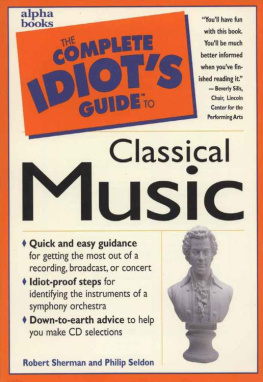

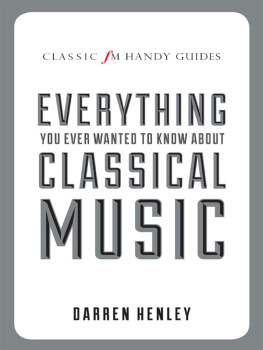
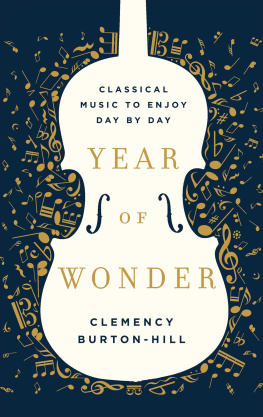
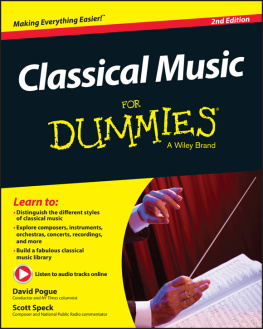
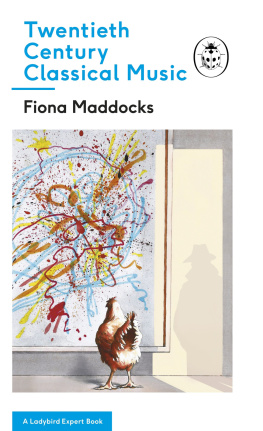
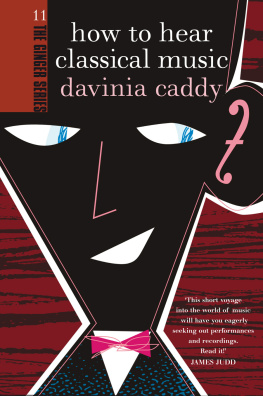
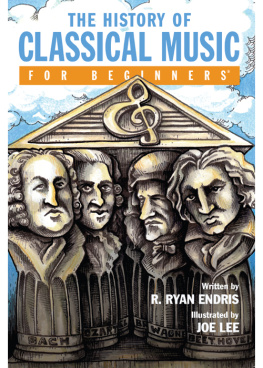
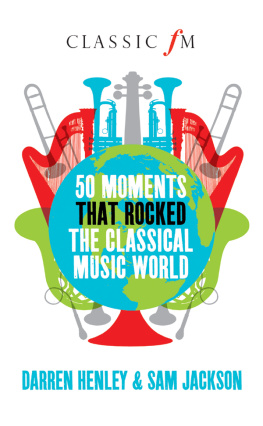

 Bet You Didnt Know
Bet You Didnt Know Warning
Warning Music Words
Music Words Important Things to Know These are tips for the reader to help you gain additional understanding of classical music.
Important Things to Know These are tips for the reader to help you gain additional understanding of classical music.